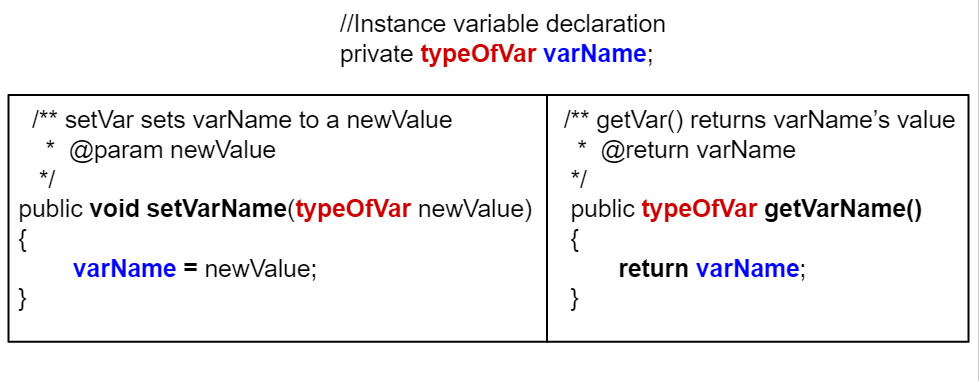📓5.5: Mutators/Setters
Table of Contents
📖 This page is a condensed version of CSAwesome Topic 5.5
Mutator Methods (Setters)
As we saw in the last section, since we typically make instance variables private, we have to define getters if we want to allow code outside the class to access the value of particular instance variables.
By the same token, if we want to allow code outside the class to change the value of an instance variable we have to provide what is formally called a mutator method but which everyone actually calls a setter. A setter is a void method with a name that starts with set and that takes a single argument of the same type as the instance variable to be set.
The effect of a setter, as you would probably expect, is to assign the provided value to the instance variable.
Just as you shouldn’t reflexively write a getter for every instance variable, you should think even harder about whether you want to write a setter. Not all instance variables are meant to be manipulated directly by code outside the class.
For example, consider the
Turtleclass. It provides gettersgetXPosandgetYPosbut it does not provide corresponding setters. There are, however, methods that change aTurtle\ ’s position likeforwardandmoveTo. But they do more than just changing the values of instance variables; they also take care of drawing lines on the screen if the pen is down.
How to Define a Setter
🪄 A setter is a void method with a name that starts with set and that takes a single argument of the same type as the instance variable to be set.
public class ExampleTemplate
{
// Instance variable declaration
private typeOfVar varName;
// Setter method template
public void setVarName(typeOfVar newValue)
{
varName = newValue;
}
}
The effect of a setter is to assign the new provided value to the object’s instance variable.
Here’s an example of the Student class with a setter for the name variable:
public class Student
{
// Instance variable name
private String name;
/**
* setName sets name to newName
* @param newName
*/
public void setName(String newName)
{
name = newName;
}
public static void main(String[] args)
{
// To call a set method, use objectName.setVar(newValue)
Student s = new Student();
s.setName("Ayanna");
}
}
Compare the difference between setters and getters in the following figure.
- Getters
returnan instance variable’s value and have the same return type as this variable and no parameters. - Setters have a
voidreturn type and take a new value as a parameter to change the value of the instance variable.

💻 In-Class Activity: Class Pet
⭐️ Summary
-
A void method does not return a value. Its header contains the keyword
voidbefore the method name. -
A mutator method or setter is a void method that changes the values of an instance or static variable.
Acknowledgement
Content on this page is adapted from Runestone Academy - Barb Ericson, Beryl Hoffman, Peter Seibel.